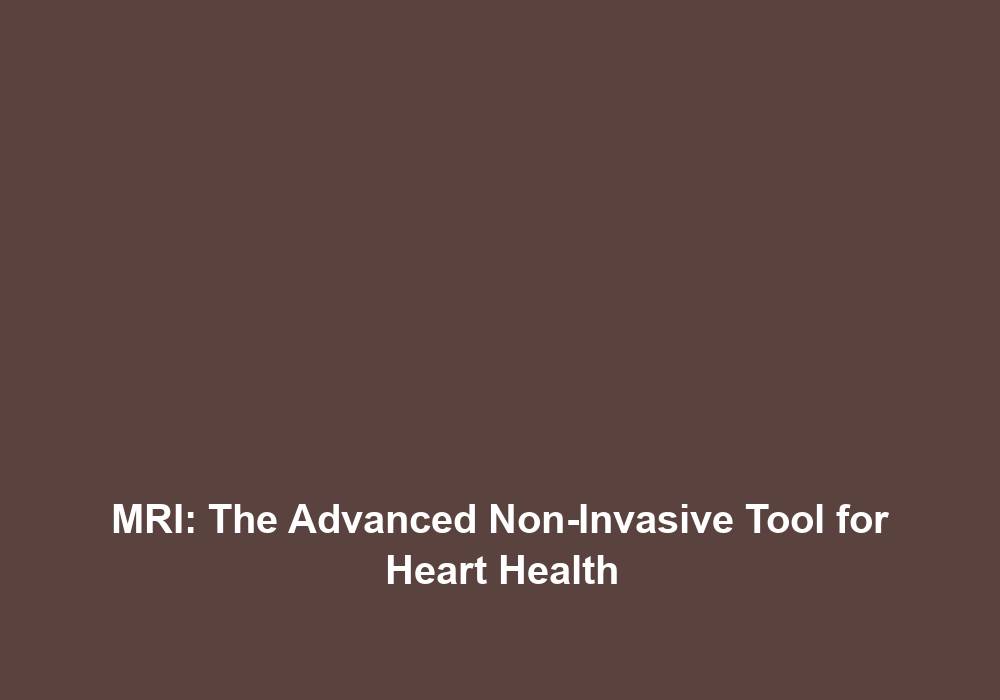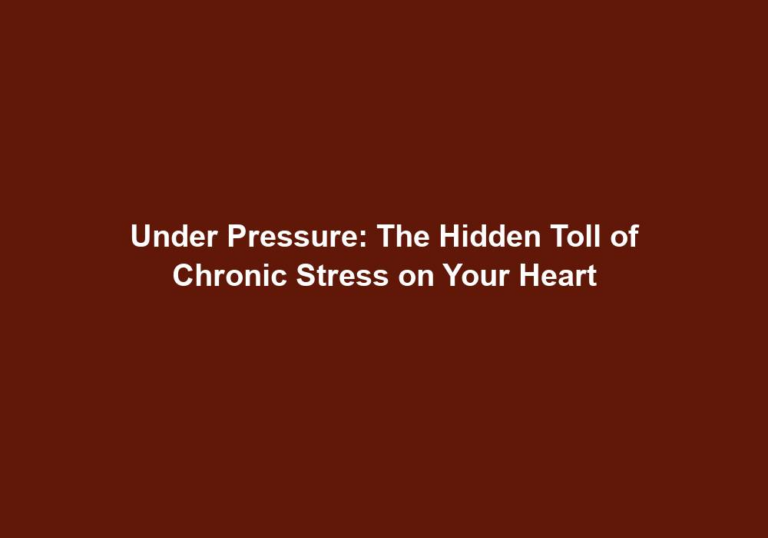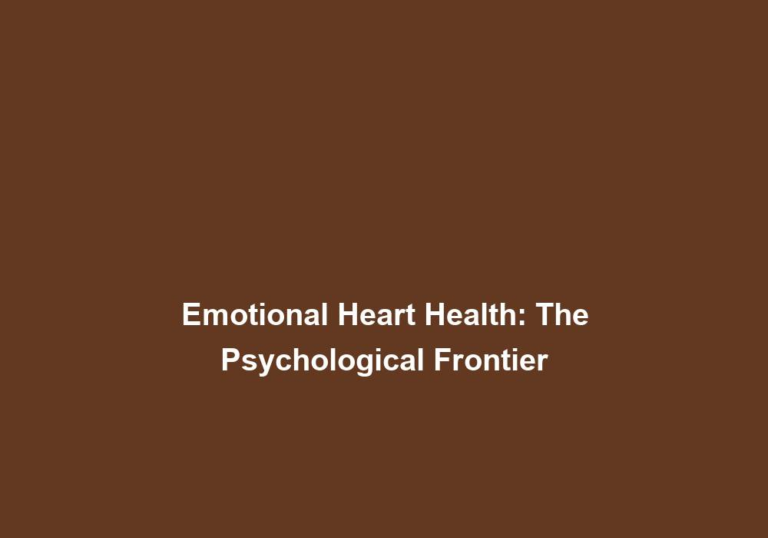MRI: The Advanced Non-Invasive Tool for Heart Health
Magnetic Resonance Imaging (MRI) has revolutionized medical diagnostics by providing a comprehensive and non-invasive assessment of various health conditions, including heart health. This advanced imaging technique utilizes powerful magnets and radio waves to generate detailed images of the heart and its surrounding structures. In this article, we will explore the importance of MRI in evaluating heart health and its various applications.
The Significance of Heart Health Assessment
The heart, being a vital organ, plays a crucial role in maintaining overall well-being. Any abnormalities or diseases affecting the heart can have a significant impact on an individual’s health and quality of life. Therefore, it is essential to assess and monitor heart health regularly.
Traditionally, invasive procedures such as cardiac catheterization and angiography were used to visualize the heart’s internal structures and blood vessels. However, these methods carry risks and may not be suitable for all patients, especially those with underlying medical conditions or risk factors. Here comes the significance of MRI as a non-invasive alternative.
MRI provides a safe and comfortable option for assessing heart health without the need for surgical incisions or catheter insertions. This non-invasive approach eliminates the risks associated with invasive procedures, making it a preferred choice for patients with complex medical conditions or contraindications. By utilizing MRI, healthcare professionals can gather valuable information about the heart’s structure, function, blood flow, and any existing abnormalities or diseases.
How MRI Works
MRI employs a strong magnetic field and radiofrequency pulses to create detailed images of the heart and surrounding tissues. During the procedure, the patient lies inside a cylindrical machine called an MRI scanner. This scanner generates the magnetic field and captures the signals emitted by the body’s tissues.
The signals obtained are then processed by a computer to construct high-resolution images of the heart. These images provide valuable information about the heart’s structure, function, blood flow, and any existing abnormalities or diseases. By analyzing the images produced by the MRI, healthcare professionals can accurately diagnose heart conditions and develop personalized treatment plans.
In addition to providing anatomical information, MRI also allows for the assessment of heart function. Parameters such as ventricular volume, ejection fraction, and myocardial perfusion can be measured, providing valuable insights into the heart’s performance. This functional assessment is essential in understanding the overall health of the heart and determining the most appropriate treatment approach.
Advantages of MRI for Heart Health Assessment
-
Non-invasiveness: MRI is non-invasive, meaning it does not require any surgical incisions or catheter insertions. This makes it a safer and more comfortable option compared to invasive procedures. Patients can undergo MRI without the risks associated with traditional invasive techniques, ensuring a more pleasant experience and reducing the likelihood of complications.
-
Detailed Imaging: MRI provides highly detailed images of the heart, allowing healthcare professionals to visualize the heart’s structures and identify any abnormalities or diseases accurately. The high-resolution images produced by MRI enable precise diagnostic capabilities, enabling healthcare professionals to make accurate and informed decisions regarding treatment plans.
-
Functional Assessment: In addition to detailed imaging, MRI allows for the assessment of heart function. By measuring parameters such as ventricular volume, ejection fraction, and myocardial perfusion, healthcare professionals can gain insights into the heart’s performance. This functional assessment is crucial in understanding the overall health of the heart and determining the most appropriate treatment approach.
-
Blood Flow Assessment: MRI can evaluate the blood flow within the heart and detect any obstructions or abnormalities. This helps in diagnosing conditions such as coronary artery disease and heart valve disorders. By assessing blood flow, healthcare professionals can identify any irregularities that may require intervention and develop targeted treatment plans.
-
Safety: MRI does not involve the use of ionizing radiation, making it a safer option compared to other imaging techniques such as CT scans or angiography, especially for pregnant women and children. The absence of ionizing radiation eliminates the associated risks and ensures the safety of patients undergoing MRI for heart health assessment.
By utilizing MRI for heart health assessment, healthcare professionals can gather comprehensive information about the heart’s structure, function, and blood flow. This non-invasive and safe imaging technique offers detailed images, functional assessment, and blood flow evaluation, providing a valuable tool for accurate diagnosis, personalized treatment planning, and improved patient outcomes.
Applications of MRI in Heart Health
1. Diagnosis and Treatment Planning
MRI plays a crucial role in diagnosing various heart conditions, including:
- Coronary artery disease: By visualizing the blood vessels supplying the heart, MRI can identify any blockages or abnormalities that may lead to coronary artery disease.
- Cardiomyopathy: MRI allows for the assessment of heart muscle abnormalities, aiding in the diagnosis and treatment planning for cardiomyopathy.
- Heart valve disorders: MRI can visualize the heart valves and detect any abnormalities or malfunctions, guiding healthcare professionals in diagnosing and treating heart valve disorders.
- Congenital heart defects: MRI provides detailed images of the heart’s structures, helping identify and evaluate congenital heart defects in both children and adults.
- Myocardial infarction (heart attack): MRI can assess the extent and location of damage to the heart muscle caused by a heart attack, aiding in treatment planning and post-infarction care.
- Pericardial diseases: By visualizing the pericardium, MRI can help diagnose and manage various pericardial diseases.
By providing detailed images and functional assessment, MRI aids in accurate diagnosis and treatment planning. It helps determine the extent and severity of the condition, guiding healthcare professionals in developing personalized treatment strategies.
2. Pre-operative Evaluation
MRI can be used to evaluate the heart’s condition before cardiac surgeries or interventions. It helps surgeons assess the anatomical and functional aspects of the heart, ensuring optimal pre-operative planning and reducing surgical risks. By obtaining detailed images and functional information, MRI enables surgeons to plan their approach and anticipate any potential challenges during the procedure. This pre-operative evaluation contributes to improved surgical outcomes and patient safety.
3. Post-operative Assessment
Following cardiac surgeries or interventions, MRI can assess the effectiveness of the procedure and evaluate the healing process. It helps monitor the heart’s recovery and identify any complications or residual abnormalities that may require further intervention. By conducting post-operative assessments with MRI, healthcare professionals can ensure that the surgery was successful and detect any issues that may require additional treatment or monitoring. This post-operative evaluation is crucial in ensuring optimal recovery and long-term heart health.
4. Research and Advancements
MRI plays a significant role in ongoing research and advancements in the field of cardiology. It allows researchers to study the heart’s mechanisms, evaluate the efficacy of new treatment modalities, and develop innovative diagnostic techniques. By harnessing the power of MRI, researchers can gain a deeper understanding of heart health and contribute to the development of improved diagnostic and treatment options. The versatility and capabilities of MRI make it an essential tool for advancing the field of cardiology and improving patient outcomes.
Conclusion
MRI has emerged as an advanced and non-invasive tool for assessing heart health. With its ability to provide detailed images, functional assessment, and blood flow evaluation, MRI is invaluable in diagnosing heart conditions, planning treatments, and monitoring post-operative outcomes. Its safety, non-invasiveness, and versatility make it an essential component of modern cardiology. By harnessing the power of MRI, healthcare professionals can ensure accurate diagnoses, personalized treatments, and improved patient outcomes.







